- Home
- Michael Crichton
Airframe Page 3
Airframe Read online
Page 3
Chapter 3
She knew the forward cabin would have the least damage, but even here some of the seat backs were broken. Armrests had torn free and swung into the aisles. Overhead luggage bins were cracked, the doors hanging open. Oxygen masks dangled from the ceiling, some missing. There was blood on the carpet, blood on the ceiling. Puddles of vomit on the seats.
"My God," Richman said, covering his nose. He looked pale. "This happened because of turbulence?"
"No," she said. "Almost certainly not. "
"Then why would the pilot - "
"We don't know yet," she said.
Casey went forward to the flight deck. The cockpit door was latched open, and the flight deck appeared normal. All the logs and paperwork were missing. A tiny infant's shoe was on the floor. Bending to look at it, she noticed a mass of crumpled black metal wedged beneath the cockpit door. A video camera. She pulled it free, and it broke apart in her hands, an untidy heap of circuit boards, silver motors, and loops of tape hanging from a cracked cassette. She gave it to Richman.
"What do I do with this?"
"Keep it. "
Casey headed aft, knowing it would be worse in the back. Already she was forming a picture in her mind of what had happened on this flight. "There's no question: this aircraft underwent severe pitch oscillations. That's when the plane noses up and down," she explained.
"How do you know?" Richman said.
"Because that's what makes passengers vomit. They can take yaw and roll. But pitching makes them puke. "
"Why are the oxygen masks missing?" Richman said.
"People grabbed them as they fell," she said. It must have happened that way. "And the seat backs are broken - do you know how much force it takes to break an airplane seat? They're designed to withstand an impact of sixteen Gs. People in this cabin bounced around like dice in a cup. And from the damage, it looks like it went on for a while. "
"How long?"
"At least two minutes," she said. An eternity for an incident like this, she thought.
Passing a shattered midships galley, they came into the center cabin. Here damage was much worse. Many seats were broken. There was a broad swath of blood across the ceiling. The aisles were cluttered with debris - shoes, torn clothing, children's toys.
A cleanup crew in blue uniforms marked NORTON IRT was collecting the personal belongings, putting them into big plastic bags. Casey turned to a woman. "Have you found any cameras?"
"Five or six, so far," the woman said. "Couple of video cameras. There's all sorts of stuff here. " She reached under a seat, came out with a brown rubber diaphragm. "Like I said. "
Stepping carefully over the litter in the aisles, Casey moved farther aft. She passed another divider and entered the aft cabin, near the tail.
Richman sucked in his breath.
It looked as if a giant hand had smashed the interior. Seats were crushed flat. Overhead bins hung down, almost touching the floor; ceiling panels had split apart, exposing wiring and silver insulation. There was blood everywhere; some of the seats were soaked deep maroon. The aft lavs were ripped apart, minors shattered, stainless-steel drawers hanging open, twisted.
Casey's attention was drawn to the left of the cabin, where six paramedics were struggling to hold a heavy shape, wrapped in white nylon mesh, that hung near a ceiling bin. The paramedics adjusted their position, the nylon webbing shifted, and suddenly a man's head flopped out of the mesh - the face gray, mouth open, eyes sightless, wisps of hair dangling.
"Oh God," Richman said. He turned and fled.
Casey went over to the paramedics. The corpse was a middle-aged Chinese man. "What's the problem here?" she said.
"Sorry, ma'am," one of the medics said. "But we can't get him out. We found him wedged here, and he's stuck pretty good. His left leg. "
One of the paramedics shined a light upward. The left leg was jammed through the overhead bin, into the silver insulation above the window panel. She tried to remember what cabling ran there, whether it was flight critical. "Just be careful getting him out," she said.
From the galley, she heard a cleanup woman say, "Strangest damn thing I ever saw. "
Another woman said, "How'd it get here?"
"Damned if I know, honey. "
Casey went over to see what they were talking about. The cleaning woman was holding a blue pilot's cap. It had a bloody footprint on the top.
Casey reached for it. "Where'd you find this?"
"Right here," the cleaning woman said. "Outside the aft galley. Long way from the cockpit, isn't it?"
"Yes. " Casey turned the cap in her hands. Silver wings on the front, the yellow Transpacific medallion in the center. It was a pilot's cap, with a stripe for a captain, so it probably belonged to one of the backup crew. If this plane carried a backup crew; she didn't know that yet.
"Oh dear me this is awful just awful. "
She heard the distinctive monotone, and looked up to see Doug Doherty, the structural engineer, striding into the aft cabin.
"What did they do to my beautiful plane?" he moaned Then he saw Casey. "You know what this is, don't you. It's not turbulence. They were porpoising. "
"Maybe," Casey said. "Porpoising" was the term for a series of dives and climbs. Like a porpoise leaping in water.
"Oh yes," Doherty said, gloomily. "That's what happened. They lost control. Terrible, just terrible. . . "
One of the paramedics said, "Mr. Doherty?"
Doherty looked over. "Oh don't tell me," he said. "This is where the guy got wedged?"
"Yes, sir. . . "
"Wouldn't you know," he said, gloomily, moving closer. "It had to be the aft bulkhead. Right where every flight-critical system comes together to - okay, let me see. What is it, his foot?"
"Yes, sir. " They shone the light for him. Doherty pushed up against the body, which swayed in the harness.
"Can you hold him? Okay. . . anybody got a knife or something? You probably don't but - "
One of the paramedics gave him a pair of scissors, and Doherty began to cut Bits of silver insulation floated to the ground. Doherty cut again and again, his hand moving quickly. Finally he stopped. "Okay. He missed the A59 cable run. He missed the A47 cable run. He's left of the hydraulic lines, left of the avionics pack. . . Okay, I can't see he hurt the plane in any way. "
The paramedics, holding the dead body, stared at Doherty. One of them said, "Can we cut him out, sir?"
Doherty was still looking intently. "What? Oh yeah sure. Cut him out"
He stepped back, and the paramedics applied the big metal jaws to the upper portion of the plane. They wedged the jaws between the overhead luggage bins and the ceiling, then opened them. There was a loud cracking sound as the plastic broke.
Doherty turned away. "I can't watch," he said. "I can't watch them tear up my beautiful aircraft. " He headed back to the nose. The paramedics stared as he left
Richman came back, looking slightly embarrassed. He pointed out the windows. "What're those guys doing on the wing?"
Casey bent down, looked through the windows at the engineers on the wing. "They're inspecting the slats," she said. "Leading edge control surfaces. "
"And what do slats do?"
You'II have to start him from the beginning.
Casey said, "You know anything about aerodynamics? No? Well, an aircraft flies because of the shape of the wing. " The wing looked simple, she explained, but it was actually the most complicated physical component of the aircraft, and it took the longest to build. By comparison, the fuse - the fuselage - was simple, just a lot of round barrels riveted together. And the tail was just a fixed vertical vane, with control surfaces. But a wing was a work of art. Nearly two hundred feet long, it was incredibly strong, capable of bearing the weight of the plane. But at the same time, precisely shaped to within a hundredth of an inch.
"The shape," Casey said, "is what's crucial: it's curved on top, flat on the b
ottom. That means air going across the top of the wing has to move faster, and because of Bernoulli's principle - "
"I went to law school," he reminded her.
"Bernoulli's principle says the faster a gas moves, the lower its pressure. So the pressure within a moving stream is less than the air surrounding it" she said. "Since air moves faster across the top of the wing, it creates a vacuum which sucks the wing upward. The wing is strong enough to support the fuselage, so the whole plane is lifted up. That's what makes a plane fly. "
"Okay. . . "
"Now. Two factors determine how much lift is created - the speed the wing moves through the air, and the amount of curvature. The greater the curvature, the greater the lift. "
"Okay. "
"When the wing is moving fast, during flight, going maybe point eight Mach, it doesn't need much curvature. It actually wants to be almost flat. But when the aircraft is moving slower, during takeoff and landing, the wing needs greater curvature to maintain lift. So, at those times we increase the curvature, by extending sections in the front and back - flaps at the back, and slats at the leading edge. "
"Slats are like flaps, but in the front?"
"Right. "
"I never noticed them before," Richman said, looking out the window.
"Smaller planes don't have them," Casey said. "But this aircraft weighs close to three-quarters of a million pounds, fully loaded. You've got to have slats on a plane this size. "
As they watched, the first of the slats moved outward, then tilted down. The men on the wing stuck their hands in their pockets and watched.
Richman said, "Why are the slats so important?"
"Because," Casey said, "one possible cause of 'turbulence' is slat extension in mid flight. Remember at cruise speed, the wing should be almost flat. If the slats extend, the plane may become unstable. "
"And what would make the slats extend?"
"Pilot error," Casey said. "That's the usual cause. "
"But supposedly this plane had a very good pilot. "
"Right. Supposedly. "
"And if it wasn't pilot error?"
She hesitated. "There is a condition called uncommanded slats deployment. It means the slats extend without warning, all by themselves. "
Richman frowned. "Can that happen?'
"It's been known to occur," she said. "But we don't think it's possible on this aircraft. " She wasn't going to get into the details with this kid. Not now.
Richman still frowned. "If it's not possible, why are they checking?'
"Because it might have happened, and our job is to check everything. Maybe there's a problem with this particular aircraft. Maybe the control cables aren't properly rigged. Maybe there's an electrical fault in the hydraulics actuators. Maybe the proximity sensors failed. Maybe the avionics code is buggy. We'll check every system, until we find out what happened, and why. And right now, we haven't got a clue. "
Four men were squeezed into the cockpit, hunched over the controls. Van Trung, who was certified for the aircraft, sat in the captain's seat; Kenny Bume was in the first officer's seat on the right. Trung was functioning the control surfaces, one after another - flaps, slats, elevators, rudder. With each test, the flight deck instrumentation was verified visually.
Casey stood outside the cockpit with Richman. She said, "You got anything, Van?"
"Nothing yet," Trung said.
"We've got diddly-squat," Kenny Burne said. "This bird is cherry. There's nothing wrong with this plane. "
Richman said, "Then maybe turbulence caused it, after all. "
'Turbulence my ass," Burne said. "Who said that? Is that the kid?"
"Yes," Richman said.
"Straighten the kid out, Casey," Burne said, glancing over his shoulder.
'Turbulence," Casey said to Richman, "is a famous catchall for anything that goes wrong on the flight deck. Turbulence certainly occurs, and in the old days, planes had some rough times. But these days turbulence bad enough to cause injuries is unusual. "
"Because?"
"Radar, pal," Burne snapped. "Commercial aircraft are all equipped with weather radar. Pilots can see weather formations ahead and avoid them. They've also got much better communications between aircraft. If a plane hits rough weather at your flight level two hundred miles ahead of you, you'll hear about the sigmet, and get a course change. So the days of serious turbulence are over. "
Richman was annoyed by Burne's tone. "I don't know," he said "I've been on planes where turbulence got pretty rough - "
"Ever see anybody get killed on one of those planes?"
"Well, no. . . "
"Seen people thrown from their seats?"
"No. . . "
"Seen injuries of any kind?"
"No," Richman said, "I haven't"
"That's right," Burne said.
"But surely it is possible that - "
"Possible?" Bume said. "You mean like in court, where anything is possible?'
"No, but - "
"You're a lawyer, right?"
"Yes, I am, but - "
"Well you better get one thing straight, right now. We're not doing law, here. Law is a bunch of bullshit. This is an aircraft. It's a machine. And either something happened to this machine, or it didn't. It's not a matter of opinion. So why don't you shut the fuck up and let us work?"
Richman winced, but didn't back down. "Fine," he said, "but if it wasn't turbulence, there'll be evidence - "
"That's right," Burne said, "the seat-belt sign. Pilot hits turbulence, the first thing he does is flash the seat-belt sign, and make an announcement. Everybody buckles up, and nobody gets hurt. This guy never made an announcement"
"Maybe the sign doesn't work. "
"Look up. " With a ping, the seat-belt sign came on above their heads.
"Maybe the announcement doesn't - "
Burne's amplified voice said, "Working, working, you better believe it's working. " The PA clicked off.
Dan Greene, the chubby operations inspector from the IFSDO, came on board, puffing from the climb up the metal stairs. "Hey, guys, I got your certificate to ferry the plane to Burbank. I figured you want to take the bird to the plant. "
"Yeah, we do," Casey said.
"Hey, Dan," Kenny Burne called. "Nice job keeping the flight crew here. "
"Fuck you," Greene said. "I had my guy at the gate a minute after the plane arrived. The crew was already gone. " He turned to Casey. "They get the stiff out?"
"Not yet, Dan. He's wedged in pretty tight. "
"We got the other dead bodies off, and sent the seriously injured to Westside hospitals. Here's the list. " He handed a sheet of paper to Casey. "Only a few are still at the 'port infirmary. "
Casey said, "How many are still here?"
"Six or seven. Including a couple of stewardesses. "
Casey said, "Can I talk to them?"
"Don't see why not," Greene said.
Casey said, "Van? How much longer?"
"Figure an hour, minimum. "
"Okay," she said. "I'm going to take the car. "
"And take fucking Clarence Darrow with you," Bume said.
LAX
10:42 A. M.
Driving in the van, Richman gave a long exhale. "Jeez," he said. "Are they always so friendly?"
Casey shrugged. "They're engineers," she said. She was thinking, What did he expect? He must have dealt with engineers at GM. "Emotionally, they're all thirteen years old, stuck at the age just before boys stop playing with toys, because they've discovered girls. They're all still playing with toys. They have poor social skills, dress badly - but they're extremely intelligent and well trained, and they are very arrogant in their way. Outsiders are definitely not allowed to play. "
"Especially lawyers . . . "
"Anybody. They're like chess masters. They don't waste time with amateurs. And they're under a lot of pressure now. "
"Me? No. And I'm a woman. And I'm from QA. Three reasons why I don't count Now Marder's made me IRT liaison to the press, which is another strike. The engineers all hate the press. "
"Will there be press on this?"
"Probably not," she said. "It's a foreign carrier, foreigners died, the incident didn't occur in the United States. And they don't have visuals. They won't pay any attention. "
"But it seems so serious. . . "
"Serious isn't a criterion," she said. "Last year, there were twenty-five accidents involving substantial airframe damage. Twenty-three occurred overseas. Which ones do you remember?"
Richman frowned.
"The crash in Abu Dhabi that killed fifty-six people?" Casey said. "The crash in Indonesia that killed two hundred? Bogota, that killed a hundred and fifty-three? You remember any of those?"
"No," Richman said, "but wasn't there something in Atlanta?"
"That's right," she said. "A DC-9 in Atlanta. How many people were killed? None. How many were injured? None. Why do you remember it? Because there was film at eleven. "
The van left the runway, went through the chain-link gate, and out onto the street. They turned onto Sepulveda, and headed toward the rounded blue contours of the Centinela Hospital.
"Anyway," Casey said. "We have other things to worry about now. " She handed Richman a tape recorder, clipped a microphone to his lapel, and told him what they were going to do.
CENTINELA HOSPITAL
12:06 P. M.
"You want to know what happened?" the bearded man said, in an irritable voice. His name was Bennett; he was forty years old, a distributor for Guess jeans; he had gone to Hong Kong to visit the factory; he went four times a year, and always flew Transpacific. Now he was sitting up in bed, in one of the curtained-off infirmary cubicles. His head and right arm were bandaged. "The plane almost crashed, that's what happened. "
"I see," Casey said. "I was wondering if - "
"Who the hell are you people, anyway?' he said.
She handed him her card, introduced herself again.
"Norton Aircraft? What do you have to do with it?"
"We build the airplane, Mr. Bennett. "
"That piece of shit? Fuck you, lady. " He threw the card back at her. "Get the fuck out of here, both of you. "
"Mr. Bennett - "
"Go on, get out! Get out!"
Outside the curtained cubicle, Casey looked at Richman. "I have a way with people," she said ruefully.
Casey went to the next cubicle, and paused. Behind the curtain, she heard Chinese being spoken rapidly, first a woman's voice, and then a man's voice responding.
She decided to move on to the next bed. She opened the curtains and saw a sleeping Chinese woman in a plaster neck brace. A nurse in the room looked up, held her finger to her lips. Casey went on to the next cubicle.
It was one of the flight attendants, a twenty-eight-year-old woman named Kay Liang. She had a large abrasion on her face and neck, the skin raw and red. She sat in a chair by the empty bed, thumbing through a six-month-old issue of Vogue. She explained that she had remained in the hospital to stay with Sha-Yan Hao, another stewardess, who was in the next cubicle.
"She is my cousin," she said. "I'm afraid she was hurt badly. They will not let me be in the room with her. " She spoke English well, with a British accent.
When Casey introduced herself, Kay Liang looked confused. "You're from the manufacturer?" she said. "But a man was just here. . . "
"What man?"
"A Chinese man. He was here a few minutes ago. "
"I don't know about that," Casey said, frowning. "But we'd like to ask you some questions. "
"Of course. " She put the magazine aside, folded her hands in her lap, composed.
"How long have you been with Transpacific?" Casey asked.
Three years, Kay Liang answered. And before that, three years with Cathay Pacific. She always flew international routes, she explained, because she had languages, English and French, as well as Chinese.
"And where were you when this incident occurred?"
"In the midcabin galley. Just behind business class. " The flight attendants were preparing breakfast, she explained. It was about five A. M. , perhaps a few minutes later.
"And what happened?"
"The plane began to climb," she said. "I know that, because I was setting out drinks, and they started to slide off the trolley. Then almost immediately, there was a very steep descent"
"What did you do?"
She could do nothing, she explained, except hold on. The descent was steep. All the food and drinks fell. She thought the descent lasted about ten seconds, but she wasn't sure. Then there was another climb, extremely steep, and then another steep descent. On the second descent, she struck her head against the bulkhead.
"Did you lose consciousness?"
"No. But that was when I scraped my face. " She gestured to her injury.
"And what happened next?"
She was not sure, she said. She was confused because the second stewardess in the galley, Miss Jiao, fell against her, and they were both knocked to the floor. "We could hear the cries of the passengers," she said. "And of course we saw them in the aisles. "
Afterward, she said, the plane became level again. She was able to get up and help the passengers. The situation was very bad, she said, particularly aft. "Many injured and many bleeding, in pain. The flight attendants were overwhelmed. Also, Miss Hao, my cousin, was not conscious. She had been in the aft galley. This upset the other stewardesses. And three passengers were dead. The situation was very distressing. "
"What did you do?"
"I got the emergency medical kits to care for the passengers. Then I went to the cockpit. " She wanted to see if the flight crew was all right. "And I wanted to tell them the first officer had been injured in the aft galley. "
"The first officer was in the aft galley when the incident occurred?" Casey said
Kay Liang blinked. "Of the relief crew, yes. "
"Not the flight crew?"
"No. The first officer of the relief crew. "
"You had two crews on board?"
"Yes. "
"When did the crews change?"
"Perhaps three hours earlier. During the night. "
"What was the name of the injured first officer?" Casey asked.
Again, she hesitated. "I . . . I am not sure. I had not flown with the relief crew before. "
"I see. And when you went to the cockpit?"
"Captain Chang had the plane in control. The crew was shaken, but not injured. Captain Chang told me that he had requested an emergency landing at Los Angeles. "
"You've flown with Captain Chang before?"
"Yes. He is a very good captain. Excellent captain. I like him very much. "
Protesting too much, Casey thought. The stewardess, previously calm, now appeared uneasy. Liang glanced at Casey, then looked away.
"Did there appear to be any damage to the flight deck?" Casey asked.
The stewardess frowned, thinking. "No," she said. "The flight deck appeared normal in every respect. "
"Did Captain Chang say anything else?"
"Yes. He said they had an uncommanded slats deployment," she said. "He said that had caused the upset, and the situation was now under control. "
Uh-oh, Casey thought. This was not going to make the engineers happy. But Casey was troubled by the stewardess's technical phrasing. She thought it unlikely that a flight attendant would know about uncommanded slats deployment. But perhaps she was just repeating what the captain had said.
"Did Captain Chang say why the slats deployed?"
"He just said, uncommanded slats deployment. "
"I see," Casey said. "And do you know where the slats control is located?"

 Dragon Teeth
Dragon Teeth Jurassic Park
Jurassic Park Micro
Micro The Great Train Robbery
The Great Train Robbery The Andromeda Strain
The Andromeda Strain The Lost World
The Lost World Congo
Congo Travels
Travels Timeline
Timeline Sphere
Sphere Westworld
Westworld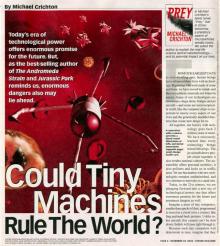 Prey
Prey State Of Fear
State Of Fear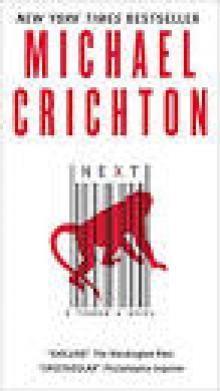 Next
Next Disclosure
Disclosure Pirate Latitudes
Pirate Latitudes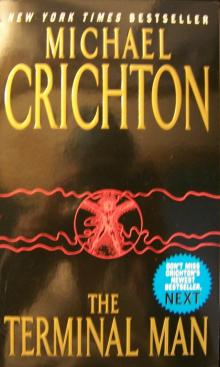 The Terminal Man
The Terminal Man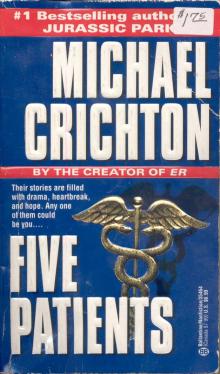 Five Patients
Five Patients Rising Sun
Rising Sun Binary
Binary The Andromeda Evolution
The Andromeda Evolution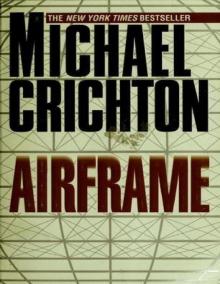 Airframe
Airframe Easy Go
Easy Go Drug of Choice
Drug of Choice Odds On: A Novel
Odds On: A Novel Scratch One
Scratch One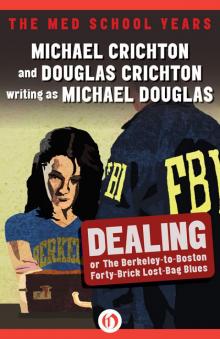 Dealing or The Berkeley-to-Boston Forty-Brick Lost-Bag Blues
Dealing or The Berkeley-to-Boston Forty-Brick Lost-Bag Blues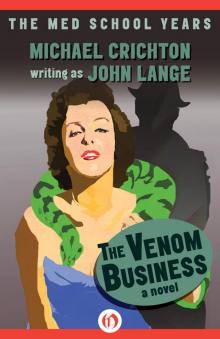 Venom Business
Venom Business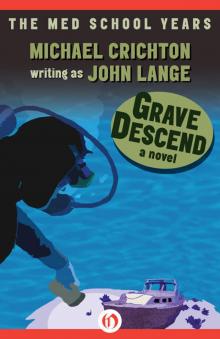 Grave Descend
Grave Descend Gold - Pirate Latitudes
Gold - Pirate Latitudes Binary: A Novel
Binary: A Novel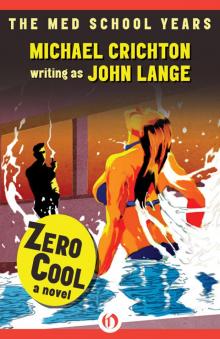 Zero Cool
Zero Cool Delos 1 - Westworld
Delos 1 - Westworld